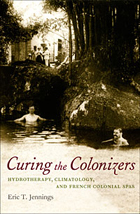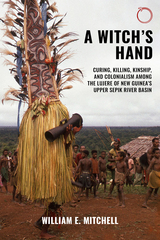
Combining the histories of empire, leisure, tourism, culture, and medicine, Eric T. Jennings sheds new light on the workings of empire by examining the rationale and practice of French colonial hydrotherapy between 1830 and 1962. He traces colonial acclimatization theory and the development of a “science” of hydrotherapy appropriate to colonial spaces, and he chronicles and compares the histories of spas in several French colonies—Guadeloupe, Madagascar, Tunisia, and Réunion—and in France itself. Throughout Curing the Colonizers, Jennings illuminates the relationship between indigenous and French colonial therapeutic knowledge as well as the ultimate failure of the spas to make colonialism physically or morally safe for the French.

From 1971 to 1972, William E. Mitchell undertook fieldwork on suffering and healing among the Lujere of Papua New Guinea’s Upper Sepik River Basin. At a time when it was not yet common to make colonial agencies a subject of anthropological study, Mitchell carefully located his research on Lujere practices in the framework of a history of colonization that surrounded the Lujere with a shifting array of Western institutions, dramatically changing their society forever. Mitchell’s work has been well known among anthropologists of Oceania, but the material in this book has remained unpublished until now.
In this major new work, Mitchell revisits his early fieldwork with a three-part study of the history of colonial rule in the region, the social organization of Lujere life at the time, and the forms of affliction, witchcraft, and curing that preoccupied them. Furthermore, Mitchell offers the first sweeping cross-cultural survey of sanguma (magical murder) in Oceania. The book presents a vivid portrait of a society that has since changed dramatically as well as an approach to anthropology that was typical of the era. This is a significant contribution to the ethnography of Papua New Guinea and is sure to be an invaluable source for researchers of Melanesia, medical anthropologists, and scholars of kinship, myth, and ritual.
READERS
Browse our collection.
PUBLISHERS
See BiblioVault's publisher services.
STUDENT SERVICES
Files for college accessibility offices.
UChicago Accessibility Resources
home | accessibility | search | about | contact us
BiblioVault ® 2001 - 2024
The University of Chicago Press









